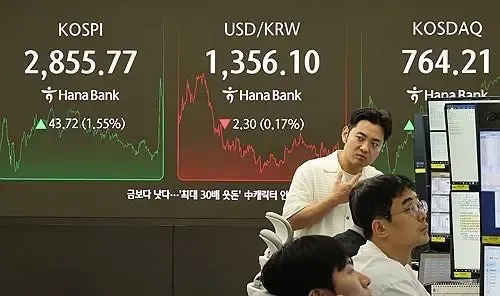Why Are Seoul Shares Dipping Over 2% Amid Tariff Concerns?

Synopsis
Key Takeaways
- Seoul's stock market saw a decline of over 2%.
- Local currency fell below 1,410 won against the U.S. dollar.
- Foreign and institutional investors led the sell-off, offloading substantial shares.
- The benchmark KOSPI index dropped to 3,386.05.
- Trade tensions continue to weigh on investor sentiment.
Seoul, Sep 26 (NationPress) South Korean stocks experienced a significant drop of over 2 percent on Friday, sliding beneath the 3,400-point threshold for the first time in ten sessions due to intensifying tariff issues and reduced expectations for U.S. rate cuts.
The local currency also fell sharply, breaching the 1,410 won mark against the U.S. dollar for the first time in over four months, as investors sought safer assets, as reported by Yonhap news agency.
The benchmark Korea Composite Stock Price Index (KOSPI) plunged by 85.06 points, or 2.45 percent, to finish at 3,386.05. This marked the first close below the 3,300-line since September 12, when it closed at 3,395.54.
Trading volume was moderate, with 389 million shares changing hands worth 12.2 trillion won (approximately US$8.63 billion), where decliners significantly outnumbered advancers with 776 to 121.
Foreign and institutional investors drove the sharp fall, offloading a net 661.1 billion won and 489 billion won worth of stocks, respectively, while retail investors acquired a net 1.1 trillion won.
Analysts highlighted that the market was heavily affected by statements from U.S. President Donald Trump, who referred to South Korea's planned $350 billion investment as merely “up front”.
“The comment raised doubts about the initial Korea-U.S. trade agreement reached in August,” stated Lee Jae-won, an analyst at Shinhan Securities Co. “Investors are also worried about the trade discussions, which have shown no progress thus far.”
Moreover, stronger-than-expected growth in the world's largest economy has lessened hopes for imminent Federal Reserve rate cuts.
Most shares closed negatively across the board.
Market leader Samsung Electronics fell by 3.25 percent to 83,300 won, while chipmaker SK hynix dropped by 5.61 percent to 336,500 won.
Top automaker Hyundai Motor decreased by 1.15 percent to 214,500 won, and its parts affiliate Hyundai Mobis fell 1.99 percent to 295,000 won.
Pharmaceutical stocks were mixed following a U.S. government announcement of 100 percent tariffs on imported branded drugs. Samsung Biologics fell 2.15 percent to 1 million won, while Celltrion rose slightly by 0.06 percent to 178,000 won.
Hanwha Aerospace, a defense giant, dropped 0.38 percent to 1.04 million won, and leading food company CJ Cheiljedang decreased by 1.5 percent to 230,500 won.
Kakao faced a significant decline, plummeting 6.17 percent to 59,300 won amid rising public dissatisfaction regarding a recent update on its popular messaging app KakaoTalk.
At 3:30 p.m., the local currency was quoted at 1,412.4 won against the greenback, down 11.8 won from the previous session, marking the highest won-dollar rate since May 14, when it was 1,420.2 won.










